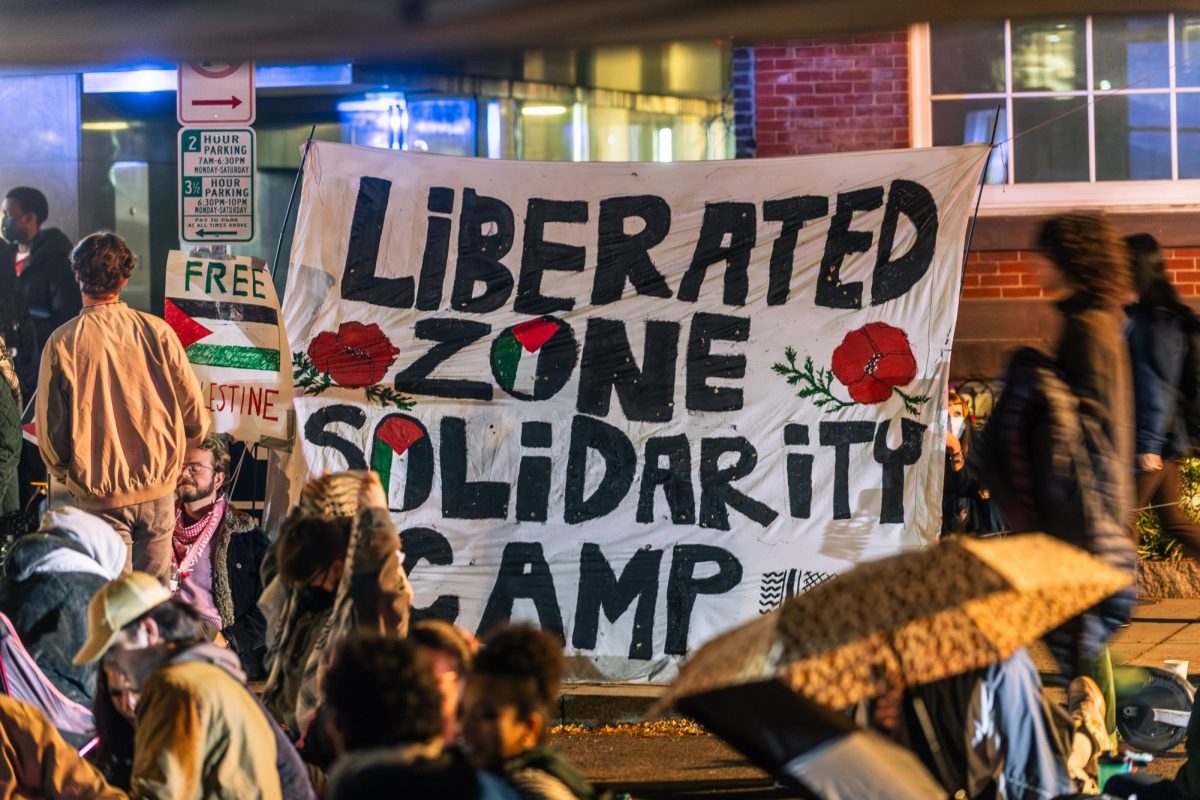Editor’s note: This article contains The Hatchet’s live coverage of day three of the encampment. To read The Hatchet’s coverage of day four, click here.
Night has fallen on the pro-Palestinian encampment in University Yard, which hit its 48-hour mark Saturday and was joined by a mirroring encampment in the middle of H Street Friday.
About 20 tents went up on the 2000 Block of H Street Friday night — police had cordoned off the block for most of Friday. By Saturday evening, demonstrators have pitched about a dozen more. Pro-Palestinian demonstrators, angered by GW’s apparent suspension of seven members of the encampment, have made it clear they won’t leave.
At least 250 people were in the H Street encampment at about 11 p.m. Saturday — some sleeping, praying, conversing or drawing chalk messages onto the street. It’s unclear how many protesters — both inside and outside the barricades of U-Yard — are GW students. As of Saturday evening, more than two dozen GW student organizations have released statements or made speeches in solidarity with the demonstration.
Officials on Friday declared that protesters remaining in U-Yard are trespassing. The Washington Post reported Friday evening that GW officials requested the Metropolitan Police Department to clear the encampment at about 3 a.m. that morning, but police officials reportedly refused. Representatives for the demonstration said Saturday that officials have limited the mobility of medics and legal assistants in and out of the U-Yard encampment.
Follow along with live updates below:
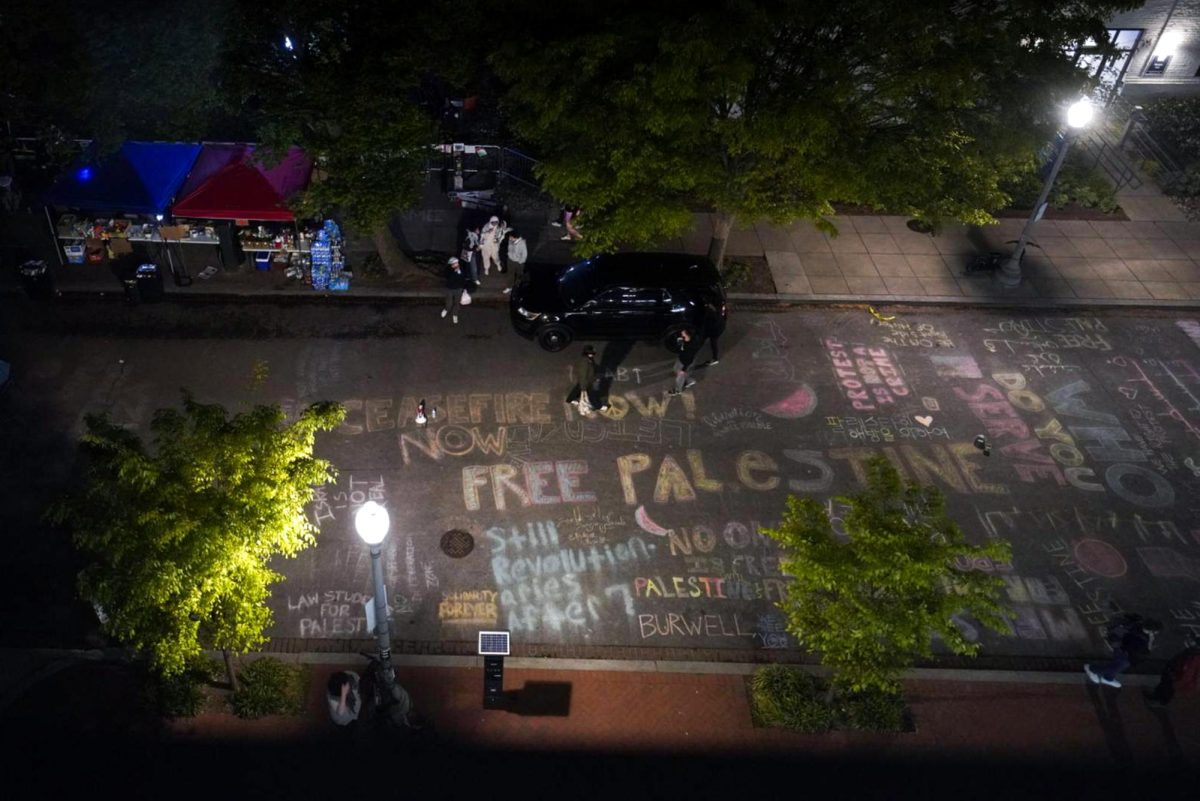
Updated 2:18 a.m. — Protesters settle into H Street for night ahead
It’s quiet on H Street as about 125 protesters linger on the closed road socializing. About 50 lay on mats and sleeping bags outside of the tents and some trickle out of the encampment for the night. Organizers have set up at least one more tent, increasing the count to 34.
Updated 1:45 a.m. —Doctoral student said she was escorted from Bell Hall office
A doctoral student said in an email Saturday night that police escorted her out of her Bell Hall office earlier in the day, but that the University had not informed professors or students with usual 24-hour access that the building was closed.
The student said some professors and students have 24-hour access to Bell Hall to care for live animals and experiments in the building’s labs.
The student said Guillermo Orti, the department chair of biological sciences, found out about the closure of Bell Hall after he asked officials why the student was escorted out of the building.
Columbian College of Arts and Sciences Dean Paul Wahlbeck emailed Orti Saturday night and said officials placed Bell Hall on “emergency mode” and blocked GWorld card access. Wahlbeck said in the email that those with ongoing experiments can contact Interim Vice President for Safety and Facilities Baxter Goodly for access to the building.
“I suspected I was racially profiled because other folks in Lisner who have equal U-Yard access to Bell were allowed to stay,” the student said in the email. “In fact, Bell and Lisner are connected and people on the fourth floor of Lisner use the bell hall bathroom.”
Updated: 11:50 p.m. — Organizers’ demands
At about 4 p.m., the DMV Student Justice for Palestine Coalition posted a list of five blanket demands of universities in the area: American, GW, Gallaudet, George Mason, Georgetown, Howard universities and the universities of Maryland and Maryland, Baltimore County. The coalition is demanding that each university drops charges against student protesters, protects pro-Palestinian speech on their campuses, divests from companies selling technology and weapons to Israel, discloses all endowments and investments and ends all academic partnerships with the state of Israel.
The post also listed school-specific demands, which are as follows:
GW’s Student Coalition for Palestine issues demanded their university:
- Drop all charges against pro-Palestine student organizers
- Protect pro-Palestine speech on campus
- Divest from companies selling technology and weapons to Israel
- End all academic partnerships with Zionist institutions
Student Justice for Palestine at American University demanded their university:
- End study abroad programs associated with the state of Israel
- Have full financial transparency of investments and endowments
- Comply with the BDS movement
- Refuse donations from donors associated with the occupation of Palestine
- Reverse AU SJP’s probation
Students at Gallaudet University demanded their university:
- Issue an official statement condemning the genocide in Gaza
- Disclose all investments
- End study abroad trips to occupied Palestine
- Drop all charges against student organizers
- Protect students’ right to protest on campus
- Put a Palestinian flag on campus
- Apologize for siding with Israel and creating an unsafe environment for Arab students
Students at George Mason University demanded the university:
- End all investments in the industrial sector within the Montano Student Fund
- End all university-sponsored trips to occupied Palestine
- End all corporate ties with defense contractors
- End all research funding defense contractors
Students at Georgetown University demanded the university:
- Completely divest from Alphabet and Amazon
- Suspend the GU Study Abroad program at Tel Aviv University and institute a PalTrek program
- Call for an end to the occupation of Gaza, the West Bank, East Jerusalem, Occupied ‘48, and the Syrian Golan Heights
- Commit to serving as a sanctuary school for Students for Justice in Palestine
- Create a group on Palestinian, Arab, and Muslim inclusion
- Call for an end to Israel’s blockade on the Gaza strip
- Call for an immediate and permanent ceasefire in Gaza
Students at Howard University demanded the university:
- Immediately divest from all corporations contributing to the violence in Gaza
- Ban the companies profiting from Israel’s colonization from coming to campus to recruit students
- Ban all individuals who are complicit in Israel’s violence from speaking to students, faculty, or staff
- Release a formal statement in solidarity with Palestine
- Condemn Howard alum Vice President Kamala Harris for facilitating genocide in Gaza
Students at the University of Maryland demanded the university:
- Cut ties with all Israeli companies and companies profiting off war crimes
- Acknowledge the genocide in Gaza
- Cut ties with unethical corporations and defense contractors
- End the censorship of pro-Palestinian messaging
- Protect Palestinian student organizers
- Remove police presence
Students at the University of Maryland, Baltimore County demanded the university:
- End research partnerships with the Israeli government
- Remove any Israeli faculty members teaching specific Political Science classes
- Boycott and divest companies complicit in the genocide in Palestine
- Put up a Palestinian flag on campus
- Protect Palestinian students and their allies
Nationwide, it appears there are few other examples of universities that have banded together in this fashion to form pro-Palestinian encampments.
Students at Duke and North Carolina State universities joined the encampment at the University of North Carolina-Chapel Hill campus within hours of the encampment’s start. UNC’s chapter of SJP organized its encampment and encouraged students from Duke and NC State to join, while the DMV Coalition organized the encampment at GW.
Coalition organizers protesters chose GW as the center of the area schools’ demonstration. The University is situated near the Metro and is blocks away from the White House and State Department.
University officials suspended GW’s chapter of SJP in November, while officials at the other participating universities’ chapters have not been suspended, with the exception of American, which was placed on probation in April.
Updated: 11:38 p.m. — Chants resume
After a lull in chants, an organizer started up the chorus again at about 11:10 p.m., chanting “Free, free Palestine,” and “There is only one solution, Intifada Revolution,” as protesters left their tents on H Street to listen to a speaker. The organizer said after the speech, they will hold quiet hours to “figure some things out.”
The speaker said their family member was killed in Gaza Friday while delivering aid to injured Palestinians and asked the crowd to keep her in their prayers.
“From the beginning of my mother’s friendship with her, my mother remembers how much her biggest dreams in life was to become a doctor to help the sick in Algeria,” the speaker said. “As the attack on Gaza continued to worsen, she made the difficult decision to leave everything behind and enter a world of uncertainty to help those in Palestine.”
As of Friday, more than 34,000 Palestinians have been killed in Gaza, according to Gaza’s health ministry.
Updated: 10:14 p.m. — Officials close Bell Hall, allow exceptions for ongoing experiments
Columbian College of Arts and Sciences Dean Paul Wahlbeck sent an email at 8:27 p.m. Saturday to Guillermo Orti, the department chair of biological sciences, where he said GW placed Bell Hall on “emergency mode,” meaning it cannot be entered using GWorld. Wahlbeck said researchers can contact Interim Vice President for Safety and Facilities Baxter Goodly if they need to access Bell Hall to care for experiments or animals.
Orti forwarded the email to the biology department at 10:04 p.m.
Bell Hall houses the biological sciences and geology departments.
Updated: 10:05 p.m. — Isha prayer
At 9:59 p.m., organizers began the Isha prayer. More than 90 demonstrators encircled the about 35 people praying while the remaining protesters chatted near tents.
Updated: 9:45 p.m. — Time outside
As dusk turns to night, the H Street encampment protesters are huddled in groups, chatting and laughing. Most have finished eating and some are doing homework on laptops.
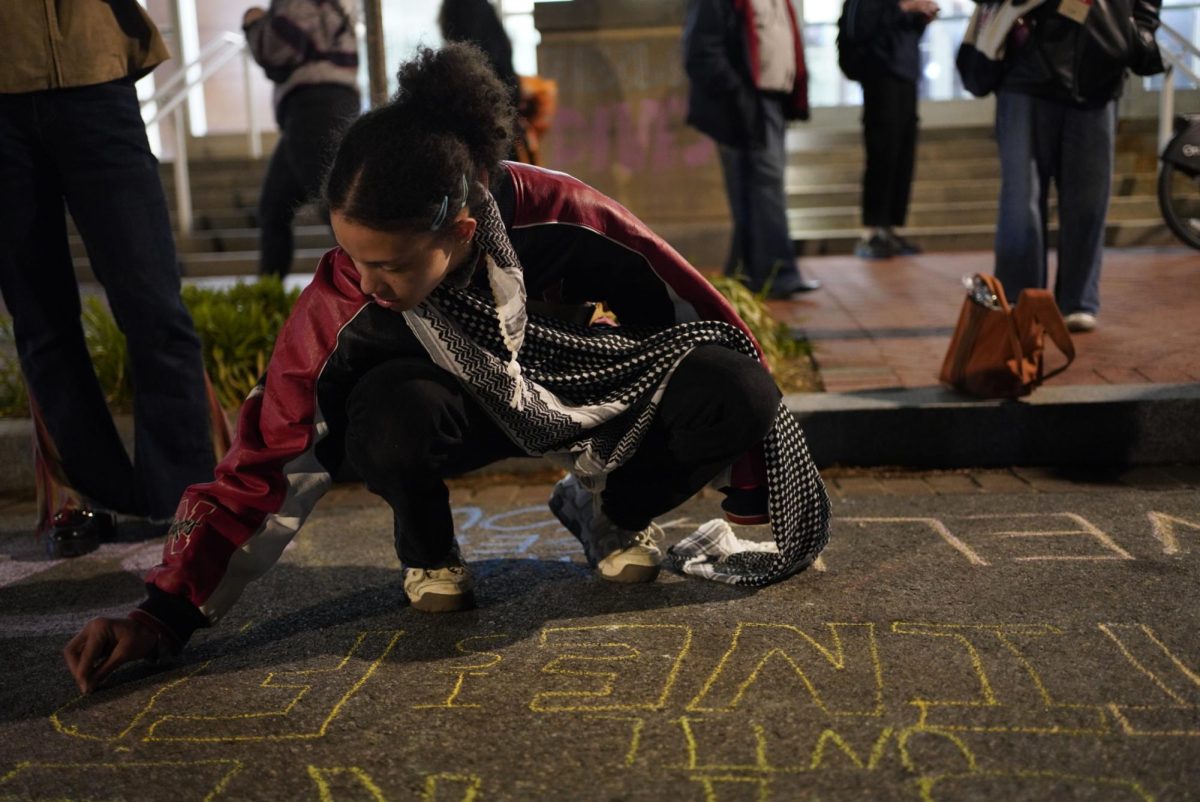
Updated: 8:37 p.m. — Maghrib prayer
At 8:25 p.m. organizers began the sunset Maghrib prayer and asked those who were not praying to encircle those who were. About 25 people prayed in H Street.
After the prayer, attendees helped put away mats.
Updated: 8:24 p.m. — Live music as the sun sets on the encampments’ third day
After speeches from student organizations ended at around 7:40 p.m. the crowd of about 200 demonstrators sat down around the H Street encampment to hear live music.
A student and another performer playing drums performed five songs as the crowd clapped to the beat. The first song was titled “The Great Homeland” and originated in the 1960s out of an Arab nationalist movement.
“We need to lift our spirits, we need to give more power to these guys back here,” the performer said as he pointed to the encampment.
After the first song, the student performer took a demonstrator’s request to play “Mawtini,” the national anthem of Iraq, sparking audience cheers and claps.
The performer continued to play, attendees clapping along as the dark settled over the encampments.
He finished the performance around 8:20 p.m.
Updated: 8:17 p.m. — Anti-Israel signs on barricade spark online backlash
Signs reading “Students will leave when Israelis leave,” and “Students will go back home when Israelis go back to Europe, US, etc (their real homes)” remain affixed to the northwest barricade between the U-Yard and H Street encampments.
Jewish on Campus, a national organization that raises awareness of antisemitism on college campuses, posted photos of the signs on Instagram at about 6 p.m.
“Newsflash: telling Israelis to go back to ‘their real homes’ isn’t the progressive take you think it is,” the post reads.
The post states that six million Jewish people were killed in Europe and that most Israelis are descendants of Jewish people who fled ethnic cleansing in the Middle East and North Africa.
About 900,000 Jewish people migrated, fled or were expelled from Muslim-majority countries in Asia and Africa during the 20th century, primarily from 1948 through the 1970s because of the 1948 Arab-Israeli War. About 650,000 of these Jewish people resettled in Israel. 750,000 Palestinians were displaced when the 1948 Arab-Israeli War ended in 1949 with Israel’s victory.
In November 1947, the United Nations General Assembly adopted the United Nations Partition Plan for Palestine, which established a Jewish State in Palestine, where many Holocaust survivors moved. Israel now occupies the West Bank, and Amnesty International considers Israel as occupying the Gaza Strip.
“The Jewish people have returned home,” the post reads. “We’re not going anywhere.”
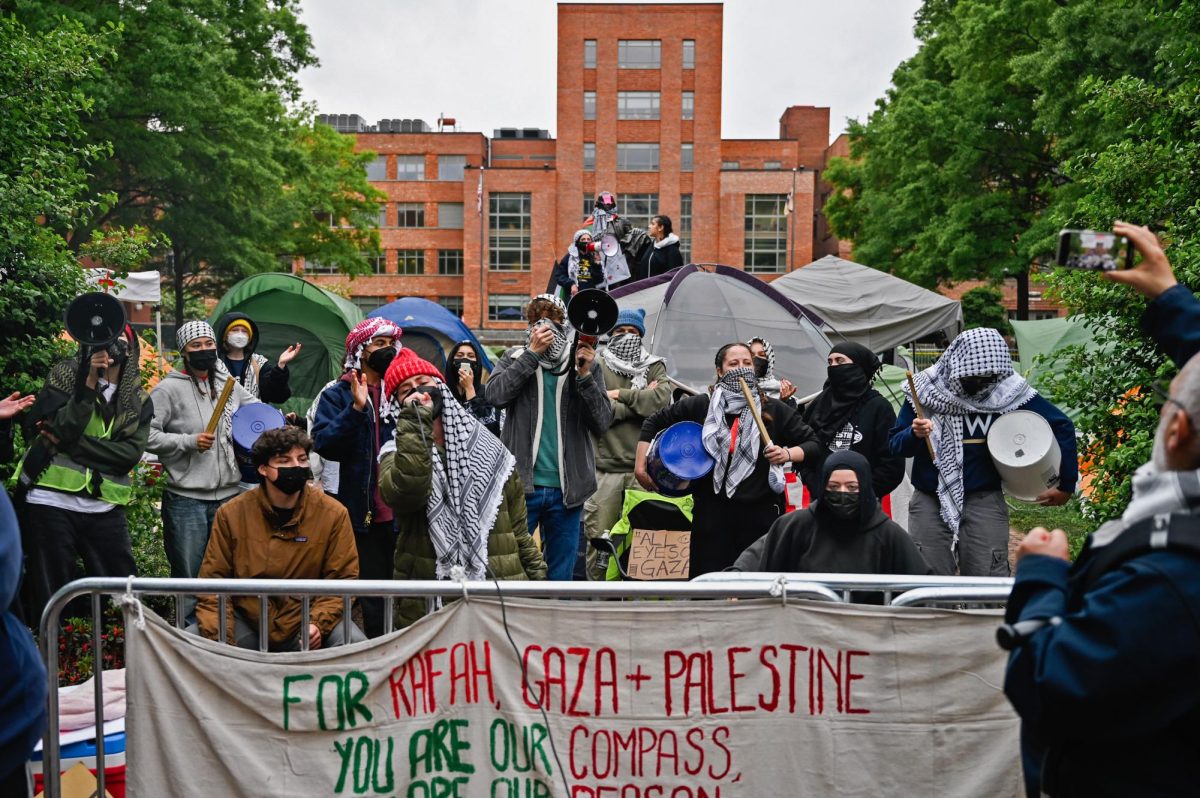
Updated: 7:59 p.m. — Speeches from members of student organizations continue
At about 7:20 p.m. a representative from Delta Lambda Phi said the organization condemns the University’s repressive actions against the pro-Palestinian organizers and demanded the University drop all charges against the students.
“We call on other GW organizations, as well as fraternities and sororities to immediately use their voice in support of student organizers and against GW’s complacency in genocide,” the representative said.
A representative from the Indian Student Association said as Indian students members have witnessed the power of protests firsthand. They condemned the University’s “mistreatment” of the students in the encampment.
“Moving forward, we must all be explicitly and actively in solidarity with all Palestinians who are facing the violence of settler colonialism,” the representative said.
At about 7:25 p.m. a representative from the Armenian Student Association said as Armenian students they understand the pain of genocide and forced displacement.
“It is in the context of our shared history that we demand liberation for all and we support the student demands,” the representative said.
At 7:35pm, a representative for the Young Black Professionals in International Affairs Organization said the organization supports students that brought “revolutionary action” to GW’s campus by participating in the encampment.
“As students and future international affairs practitioners, we aim to create a more just, equitable and liberated world order,” the representative said. “No amount of sanctioning can hinder or halt this mission driven by the student activists on our campus.”
Updated: 7:20 p.m. — More speeches from student organization representatives
At 6:50 p.m. a representative from Soulful Brewings, a cultural healing organization, said the organization sees their goals as “bound” with the liberation of Palestine and called the University “complicit” in the deaths of children in Gaza.
“We hold President Granberg alumni donations team who have betrayed us all by persisting in and persisting and donating millions to London on green f*cking pockets.” the representative said.
A representative from GW RAGE said the conflict in Gaza is restricting women’s reproductive rights and resulting in an increase in miscarriages. They said the organization calls on Granberg to protect pro-Palestinian speech and divest.
“We urge any other advocacy organizations here at GW to speak out,” the representative said.
A member from the Mexican Student Association said the organization calls on GW to disclose and divest University funds from companies supplying weapons to Israel, drop all charges against pro-Palestinian protesters and protect free speech on campus.
“We must remember that the function of freedom is to free someone else power to them,” the representative said.
At about 7:10pm, a representative for the Caribbean Student Association said Caribbean students can relate to the struggle of oppressed Palestinians under a “Zionist regime” and said the administration is “disregarding” the wellbeing of their students.
“As Caribbean students, we know the oppressor will continue to take and take as long as others stay silent,” the representative said.
At 7:15 p.m. a representative from the Chinese Students Association called University President Ellen Granberg a “coward” and urged students to leave their dorms and join the demonstration.
“We explicitly condemned the harassment and intimidation faced by our peers participating in the campaign in solidarity with Palestine and GW and DMV SJP,” the representative said. “We will not stand by a university that suppresses student speech.”
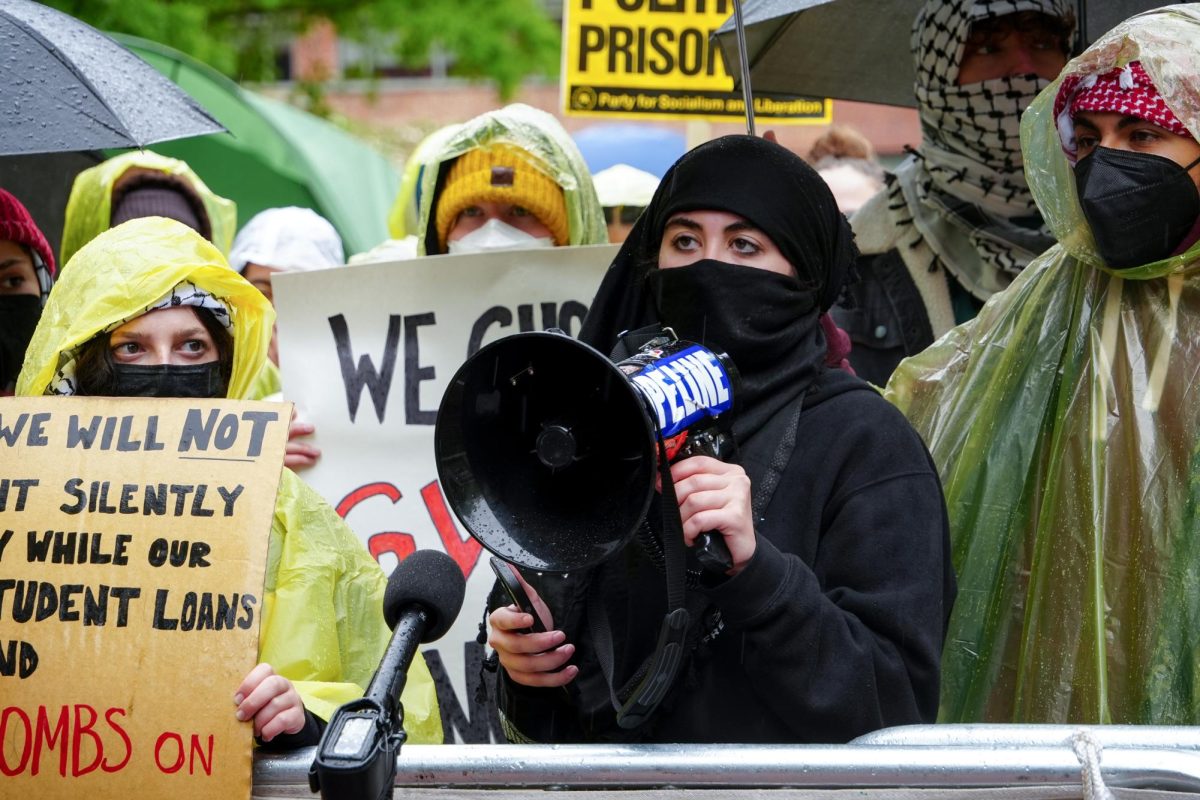
Updated: 7:12 p.m. — Inside the U-Yard encampment
Inside the U-Yard encampment Saturday afternoon, some students are huddled together, talking among themselves. Demonstrators in yellow vests chat with people on the outside of the barricade. Most of the tents in the patches of grass are zipped shut, a few are likely filled with demonstrators trying to get some rest.
GW Police Department presence in the encampment is less pronounced than in prior days. Four officers are visible inside the encampment around 7 p.m. Now most staff here are GW’s security staff, with roughly 10 guards in the area.
Updated: 6:46 p.m. — Student organizations issue statements solidarity with encampment, condemn officials’ suspension of students
More than a dozen student organizations have made statements Saturday in solidarity with the encampment, condemning officials suspension of student protesters.
The Mexican Student Association posted a statement of solidarity around 4 p.m. The organization states it “unequivocally” stands in solidarity with Palestinians and student protesters who voice pro-Palestinian support. The post also echoes support for the demands of DMV SJP.
“The shadows of colonial legacies, entrenched prejudices, and authoritarian regimes have pushed the Mexican community to stand united with Palestinians and their quest for justice,” the post reads. “We must remember that the function of freedom is to free someone else. From the river to the sea, Palestine will be free.”
Around 4:15 p.m., Soulful Brewings, an organization promoting cultural healing for students of color through tea-sipping conversations and art, posted a statement of solidarity for the allegedly suspended student’s participating in the encampment. The Instagram post “condemns” University officials for “harming” the student body and allegedly revoking suspended students’ housing, especially students and professors of color and Palestinians.
“We understand the interconnectedness of all struggles against oppression,” the post reads. “Our liberation is bound with the liberation of Palestine, and we refuse to stand idly by while our peers and friends are unjustly targeted and oppressed.”
Around 4:30 p.m., the GWU Caribbean Student Association posted on Instagram that they stand in “unwavering” support with Palestine and DMV SJP. The post said they “denounce” the University and their “numerous attempts to incite violence against students and suppress student speech.”
“Our nations, intimately acquainted with the scars of imperial violence and enduring wounds of settler colonialism, recognize the urgent need to amplify voices advocating for justice and liberation,” the post reads.
Young Black Professionals in International Affairs said in a statement on Instagram that as current international affairs students, they “refuse” to believe that civil disobedience should only occur in classrooms. The post referenced GW’s moniker, saying the University should support the students who have brought “revolutionary action” to campus.
“There is no justification for administrative penalization of students who exercise their fundamental rights to freedom of speech, peaceful assembly and petition,” the post reads.
Delta Lambda Phi said their organization strongly condemns the “egregious and repressive” tactics to suppress the encampment and called on other GW student organizations to speak in support of organizers “immediately.”
“As an organization for progressive queer men, DLP understands the fight for liberation,” the Instagram post reads. “Our values are integrity, excellence, diversity, service, justice, friendship, and commitment. It is for this reason that we as the Alpha Chapter at GWU resolutely stand with student organizers across the DMV and their struggle.”
Black Girl Mentorship Program said they are proud to support their peers and other organizations at the encampment.
“The definition of mentorship is grounded in the value of empowerment and community building, thus it is crucial to stand in solidarity with those at the encampment and in Palestine,” the post reads.
WRGW District Radio issued a statement in support of the encampment, saying as a station built on First Amendment rights, they condemn officials’ suspension of student demonstrators. The station urged officials to drop the student conduct charges and asked students affiliated with the organization to “stand in solidarity with student expression.”
At the protest Saturday afternoon, speakers from several student organizations spoke to the H Street encampment crowd, denouncing GW and calling for solidarity with the encampments among student organizations.
Updated: 6:41 p.m. — Speeches and songs from student groups
Demonstrators in the crowd are waving flags, clapping to the beat of drums and raising cardboard “Free Palestine” signs in the air as representatives from student organizations sing songs and give speeches in support of protesters in the encampment.
At around 6:13 p.m. a musical group requested that people in the crowd raise their fists in the air and two members started singing while the other two played a drum and guitar.
“For every child killed, for every mother mourning, for every martyr taken too soon,” the song read.
At around 6:20 p.m. a representative from the Arab Students Association said Palestinian students have “virtually no” support or spaces on campus to grieve and administrators have attempted to silence their fight for Palestinian rights. They said members of the student organization will stand outside of the U-Yard encampment boundary to support the demonstrators inside and demand that GW discloses and divests from financial ties with Israel.
“The over policing of the protests exemplifies the power of the student solidarity movement, and how important the struggle is to the end to end the occupation and the liberation of Palestine,” the representative said.
At 6:30 p.m. a member from the Asian American Students Association told other student organizations to “not stay silent” while demonstrators in the encampment face suspension.
“We urge every cultural and religious or to take a firm stance on of solidarity and to start pressuring the university to listen to students,” the representative said.
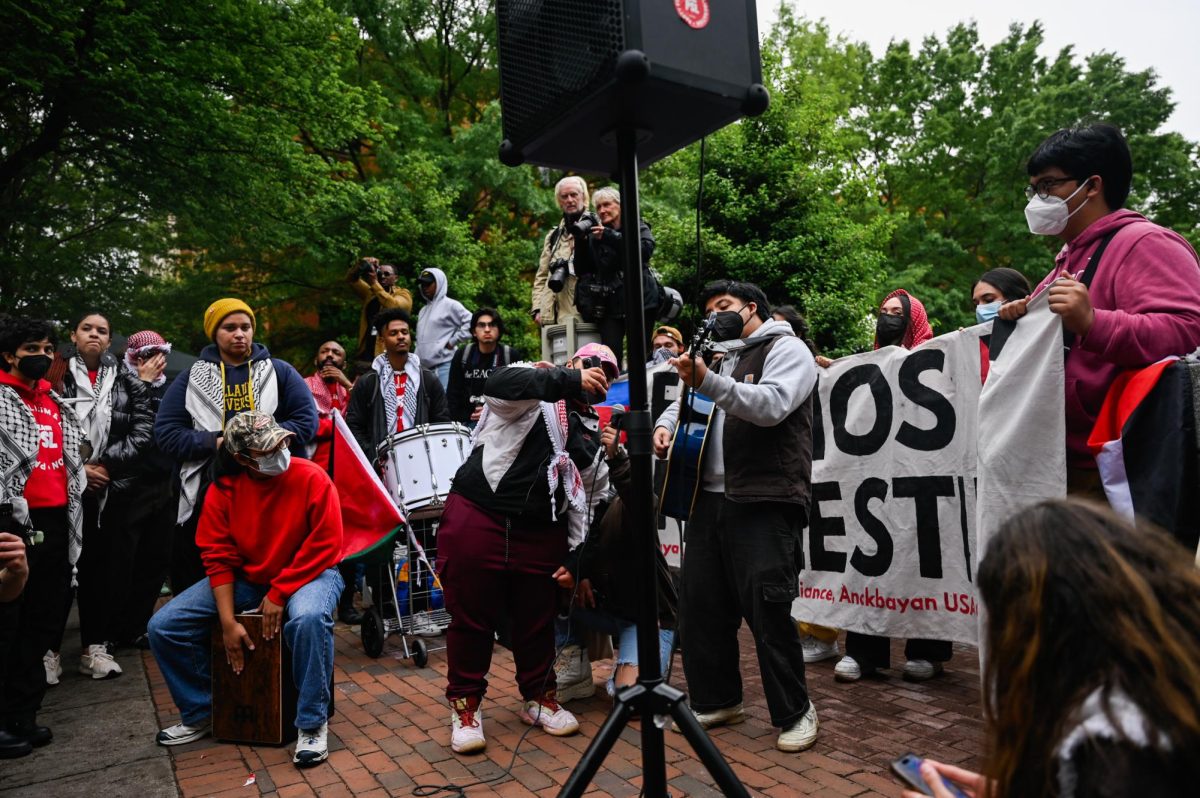
Updated: 6 p.m. — Chants continue
At around 5:20 p.m. organizers inside the U-Yard encampment led the crowd of more than 200 demonstrators gathered at the H Street encampment in chants like “GW take a stand, divestment is our demand,” “GW we know you, you endanger students too” and “If we don’t get no justice then they don’t get no peace.”
Updated: 5:58 p.m. — Mixed press, medical, legal access to blocked-off U-Yard encampment
The Hatchet swapped three staff members into the encampment at about 4 p.m., replacing three other staffers, to continue coverage from inside U-Yard.
University officials and GWPD officers have allowed Hatchet staffers to swap in and out of the fenced-off U-Yard area without the threat of student conduct violations, an informal agreement between The Hatchet and GW officials. With oversight from a GWPD officer, Hatchet staff have continually rotated reporters, editors and photographers inside and outside the encampment since officials put up barricades Friday morning.
For demonstrators and encampment supporters, moving in and out of the barricades isn’t as easy. In a statement, the Council of American-Islamic Relations said student demonstrators told them officials have limited the mobility of medics and legal assistants in and out of the U-Yard encampment.
Over the past few days, legal counselors from the National Lawyers Guild took shifts in the encampment, offering students advice on protester-police interactions, but as of Saturday afternoon, no lawyers from the guild appear to be in the encampment.
Students in the encampment are unable to re-enter if they leave, so those remaining in U-Yard have likely been here for about 60 hours. People outside the barrier have passed food, medical supplies and clothes into the encampment without punishment.
“The University continues to allow those on the University Yard access to food and water, and provides toilet facilities accessible by showing a personal GW ID,” University spokesperson Josh Grossman said in a statement. “Medical assistance is also available, if needed.”
Student speakers in the encampment said in speeches at about 5:45 p.m. that GW has denied “running water” and “bathroom access” for protesters in the encampment.
“As our internal medic prepares to head out, GWPD and MPD are denying the entrance of another medic,” a speaker in the U-Yard encampment said to protesters outside.
Updated: 4:51 p.m. — Office of Student Life administrators survey encampment
At around 4:30 p.m. Dean of Students Colette Coleman and Assistant Director of Student Involvement David Bonilla-Ciferri walked to the Lisner Hall patio on the south side of U-Yard. They joined Assistant Dean of Student Life Brian Joyce. The three looked across the grass with Joyce occasionally pointing toward the encampment. Coleman was seen typing on her phone.
Updated: 4:37 p.m. — Security’s scheduling, pizza
At 4:18 p.m., one security guard told another they must clock out before leaving the encampment, a likely indicator that GW has set up a long-term shift schedule for security to watch demonstrators. A few minutes later, another guard brought in four boxes of Andy’s Pizza.
Updated: 4:24 p.m. — Demonstrators add bookshelf to H Street encampment
Protesters on H Street set up a communal bookshelf with a sign reading “the Refaat Alareer Memorial Library.” Refaat Alareer, the shelf’s namesake, was a Palestinian writer and poet who was killed in October by an Israeli airstrike in northern Gaza.
Books on the shelf include “Global Civil War” by William I. Robinson, The Autobiography of Malcolm X by Malcolm X and Alex Haley and “This is an Uprising” by Mark and Paul Engler. Some protesters have been seen taking books from the shelf and browsing the selection.
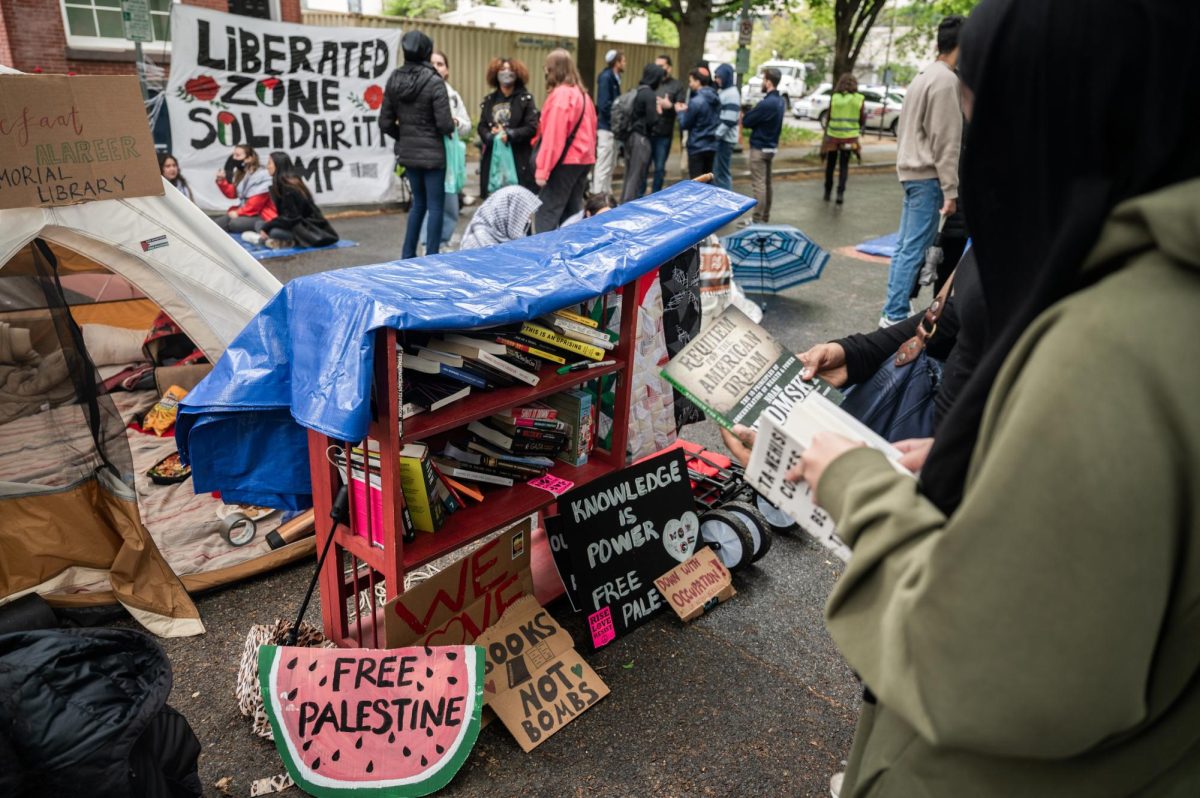
Updated: 4:11 p.m. — Muslim advocacy group calls on GW to allow lawyers, medics into encampment
The Council on American-Islamic Relations called on GW Saturday afternoon to allow medical access and legal observers into the fenced-off U-Yard encampment.
CAIR, a Muslim advocacy and civil rights organization, said in a press release that GW Police Department officers are not allowing new medical support into the encampment and are reportedly telling students that when a medic leaves, they will not be able to reenter, nor will a new medic be able to take their place. The release states that, according to students, GWPD will “decide if there is a need for medical assistance.”
Police are also refusing to allow legal observers into the encampment with the students. Legal observers from the National Lawyers Guild are at the barricade of the encampment, talking to demonstrators in and outside of the space about their interactions with police.
“Peaceful demonstrators seeking an end to the genocide in Gaza should have access to medical assistance and legal support,” CAIR National Executive Director Nihad Awad said in the release “We urge university officials to support the First Amendment rights of students to peaceable assembly and to speak out against Israel’s ongoing genocide, ethnic cleansing and forced starvation in Gaza.”
Awad also spoke at the encampment on Thursday, the release states.
Officials added metal barricades around U-Yard Friday morning, with GWPD officers behind the barricades, guarding the entrances into U-Yard. On Saturday morning, officials added another wall of barricades down the middle of U-Yard, cutting the space in half.
Updated: 4:04 p.m. — Signs, chalk on barricade, building
A number of signs have been taped to the barricade separating the encampment from the protesters and tents on H Street.
One reads, “Students will leave when Israelis leave.” Another reads, “Students will go back home when Israelis go back to Europe, US, etc (their real homes).”
Other signs include “Resistance is beautiful,” “Free Palestine” and “End the occupation.”
A number of chalk inscriptions have also appeared on the outside of the Media & Public Affairs building, including “Pigs off campus” and “Joe Biden kills kids.”
3:26 p.m. – More cultural student organizations comment on demonstrators’ alleged suspension
Student organizations continue to flood Instagram with posts condemning administrators’ reported decision to suspend seven students Friday for their involvement in the encampment. Most organizations that posted Saturday have remained steadfast in their support of the pro-Palestinian movement through social media statements in the past six months.
GWU Asian American Student Association called on cultural and religious organizations in a post to end their silence and complicity and to stand in solidarity with student organizers and Palestinians.
GW Indian Students’ Association said in a post around 2:15 p.m. that as Indian students, they have seen the power of protest “first hand” from the independence movement against British colonizers.
“Mobilization around student suppression is not just about solidarity with students, but with Palestinians in Gaza who are still under siege and facing an active genocide,” the post states.
The GW Organization of Latin Americans said in a post at about 2:20 p.m. they “strongly condemn” GW’s threats of “use of force” and acts of suspension against peaceful protesters. The post states that the organization has seen that change doesn’t come from silence and acceptance of the status quo, but instead from those who stand up and advocate for equitable treatment by those in power.
The GWU Black Student Union said in a post around 2:25 p.m. that they stand “shoulder to shoulder” with the students currently inside of U-Yard and they denounce GW’s “punitive” measures including the suspicion of seven students and “reckless” revocation of housing.
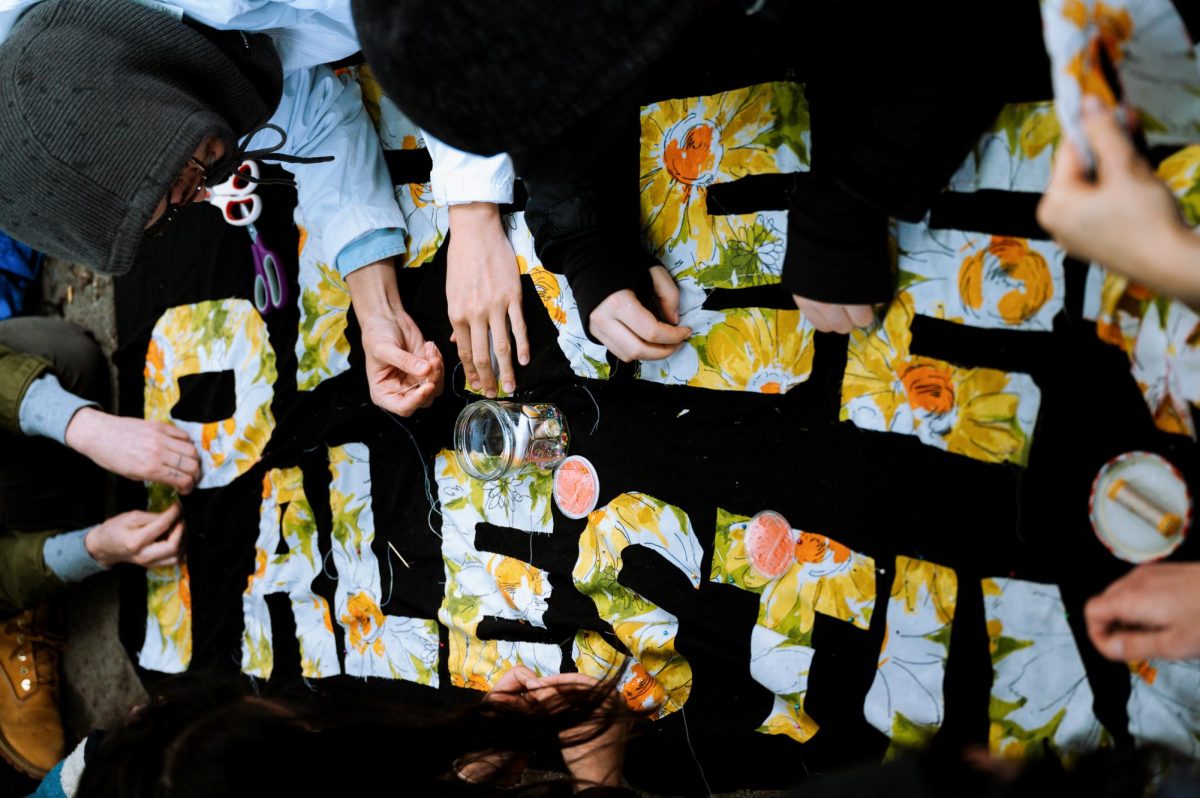
Updated: 2:57 p.m. — Lunch
Organizers announced an intermission in chanting at 2:22 p.m. to distribute lunch to the group of about 100 demonstrators that have assembled in front of the encampment. An organizer said the “larger community” provided turkey and vegetable wraps and macaroni, as well as nonperishable food, like protein bars and chips.
The organizer told protesters to take as much food as they need but to not let it go to waste. They said to remember people in Gaza don’t have reliable access to food.
The United Nations reports that there is an imminent, man-made famine in Gaza, with more than 80 percent of people in Gaza experiencing “catastrophic levels of hunger.”
“Remember we are fighting and we are standing for people who do not have food,” the organizer said.
Updated: 2:29 p.m. — Press conference
Representatives for the pro-Palestinian coalition running the encampment held a press conference by the barricades facing H Street at about 1:40 p.m.
An organizer began by restating protesters’ demands, including that officials drop all charges against pro-Palestinian students, organizers and organizations; divest from companies selling technology and weapons to Israel and “immediately disclose” all endowments, investments and academic partnerships with Israel. A crowd of about 100 protesters and members of the press gathered around the demonstrators, frequently responding to their statements with cheers and chants.
“We have been out here for 57 hours, and we are not going anywhere,” the organizer said.
The organizer said as of last night, administrators “tightened” the barricade around the demonstrators’ encampment in U-Yard this morning, which is “completely cutting off” access to bathrooms.
“This is an explicit confrontation to the very idea of a liberated zone,” the organizer said.
A University spokesperson did not immediately return a request for comment.
After the presser, a GWPD officer stationed by a door to Corcoran Hall — the building that officials have previously allowed students to access for bathroom use — said students, including those in the encampment facing suspension, can continue to use the Corcoran bathroom.
The organizer said police and administrators refused to let medics and “legal observers” into the encampment. The organizer said they are concerned about the “reproductive consequences” of students inside the encampment as some are menstruating and lack access to sanitary period products.
About five minutes after the organizer began speaking, they said they would take questions, accompanied by another demonstrator.
A person in the crowd asked if the demonstrators in the encampment are currently negotiating with administrators about their demands, access to areas on campus or calls for a ceasefire in Gaza. The organizer replied saying the demonstrators need to negotiate with administrators for the “sustainability” of their encampment and “well-being” of demonstrators, but will continue to prioritize fighting for their outlined demands.
The organizer said officials have been “cowardly” in their conversations and try to work around them.
Another member in the crowd asked the organizer how people outside of the barrier could support the demonstrators in the encampment. The organizer replied by saying “showing up” and continuing to pressure the administration to grant their demands.
The organizer declined to comment on the number of protesters still inside the encampment.
When asked if University President Ellen Granberg has communicated with demonstrators, the organizer said Granberg is the only top official who has not visited the encampment, and has not directly communicated with demonstrators.
Another person in the crowd asked what time the demonstrators that were suspended left the “grounds of the University.” The organizer said they left 9 a.m. when the sanctions were officially put in place.
Updated: 1:20 p.m. – Student organizations condemn reported suspension
Student organizations took to Instagram to condemn GW’s reported suspension of the seven students. GW Reproductive Autonomy and Gender Equity said officials’ decision early Friday morning to request the Metropolitan Police Department to clear the U-Yard encampment, as well as officials’ reported threat to evict demonstrators from campus housing, is an “abhorrent violation” of GW’s commitment to protect and support students.
GW Casa Blanca, a student organization that aims to create a safe space on campus for Latinx students, said in an Instagram post at around 11 a.m. Saturday that the organization stands in solidarity with the students, alumni and faculty protesting for the freedom of Palestinians. The post states that the organization rejects all forms of discrimination and requests GW administrators protect pro-Palestinian students’ free speech rights.
GWU Chinese American Student Association said in an Instagram post at about noon that the organization stands in support of the encampment and called for the removal of police presence at the demonstration. The post states that GWU CASA cannot stand by a university that suppresses student speech and does not support the “gross misuse” of members’ tuition.
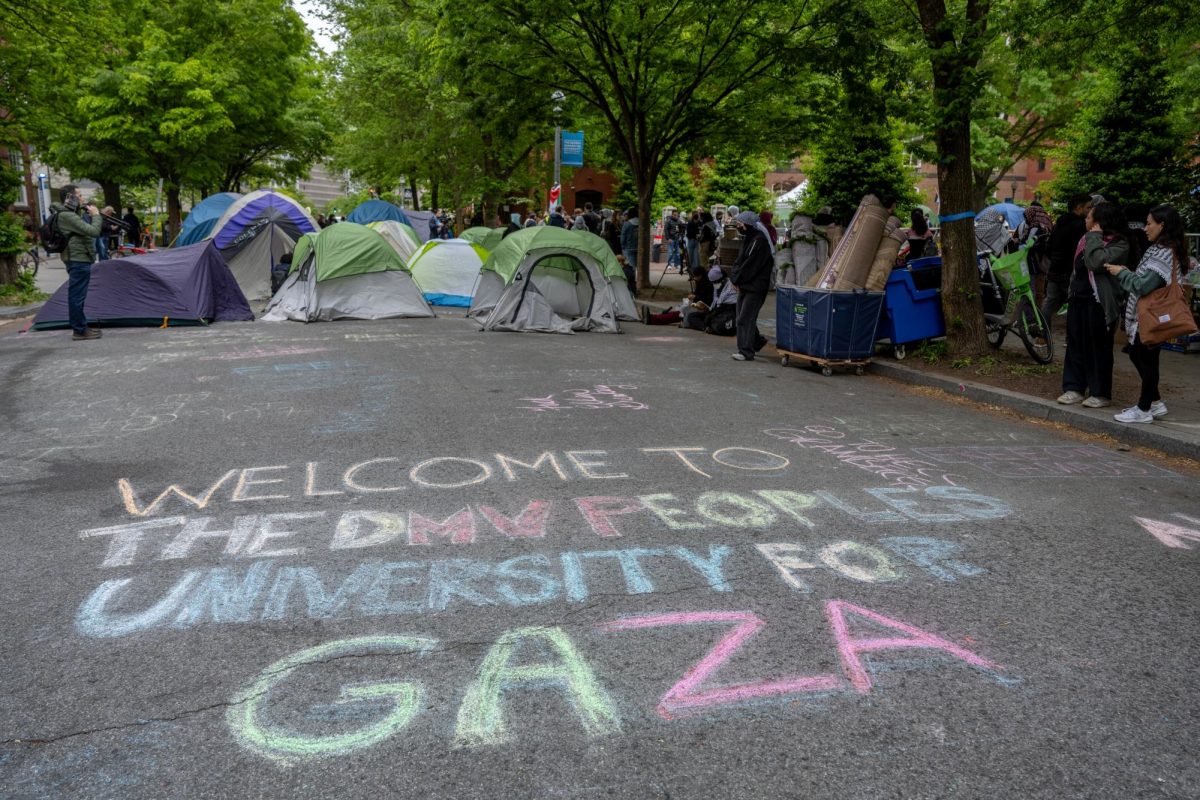
Updated 1:01 p.m. — Protesters announce press conference and resume chanting
A demonstrator outside of U-Yard around 12:45 p.m. announced that protesters inside the encampment would be giving a press conference at 1:30 p.m. where students inside U-Yard would be able to inform the public about what is happening inside the encampment.
After the announcement protesters gathered outside U-Yard resumed chanting.
“We want justice, you say how? End the siege on Gaza now,” Protesters chanted.
Updated 12:49 p.m. — Administrators converse in encampment
Provost Chris Bracey entered the encampment at around 12:42 p.m. and conversed with three GWPD officers. Bracey then walked to the south side of the encampment barrier to speak with Dean of Students Colette Coleman, two staff members and one demonstrator.
Protesters resumed chanting at about 12:46 p.m.
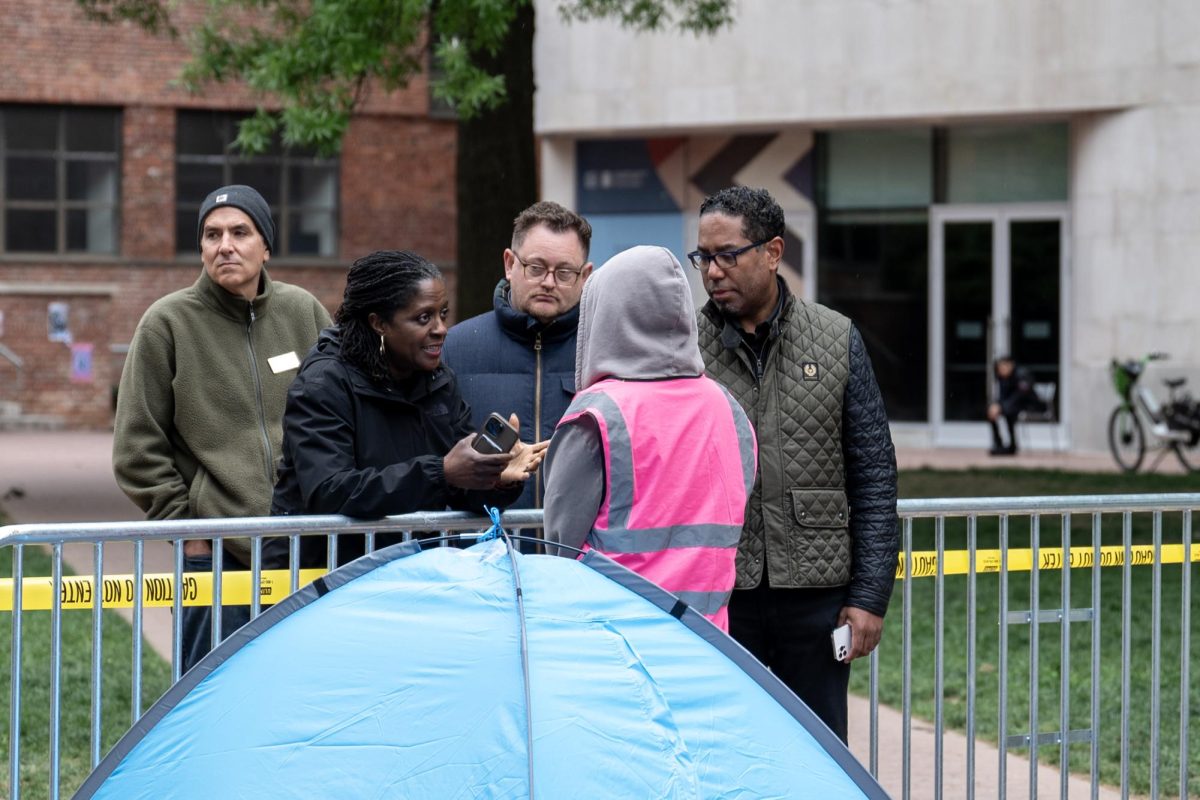
Updated 12:32 p.m. — University update on student suspensions
A University spokesperson said officials cannot confirm or comment on the existence or status of individual student conduct cases and legal action against students. Organizers said at a rally Friday that officials had suspended seven students, charging them each with nine counts of misconduct.
The spokesperson said students under temporary suspensions, which typically last up to 21 days, lose access to housing and other campus facilities, and coursework during the suspension is “generally prohibited.” They said students under “non-temporary” suspensions, which typically last at least one semester, will not receive credit or refunds for courses taken during the semester of their infraction but may receive “educational and restorative” sanctions.
The Code of Student Conduct states that the Vice Provost for Student Affairs Colette Coleman is in charge of determining suspensions, which the spokesperson said occurs under “specific circumstances.” The spokesperson added that Coleman and Provost Chris Bracey are required to agree on the determination on non-temporary suspensions.
Updated 12:03 p.m. — Joyce enters U-Yard
Assistant Dean of Student Life Brian Joyce walked through U-Yard to the barricade on the south side of the encampment, stopping to speak with an organizer at the fence before exiting through Corcoran Hall.
Updated 11:57 a.m. — Officials barricade half of U-Yard
Officials added barricades that effectively split U-Yard horizontally. The additional barricades further constrain the encampment’s territory to the northern half of U-Yard, separating them from Lisner and Bell Halls and GW Law.
An official said students will still have access to the bathrooms in Corcoran Hall. Students moved tents flush against the barricade but declined to comment as to whether it was a move to preserve their territory.
Baxter Goodly, the senior associate vice president of facilities planning, construction and management, said the protesters will still have access to the bathroom and have sufficient space for their tents.
“We think that they have plenty of the lawn here and we felt we could reclaim some of the lawn without impacting their site,” Goodly said.
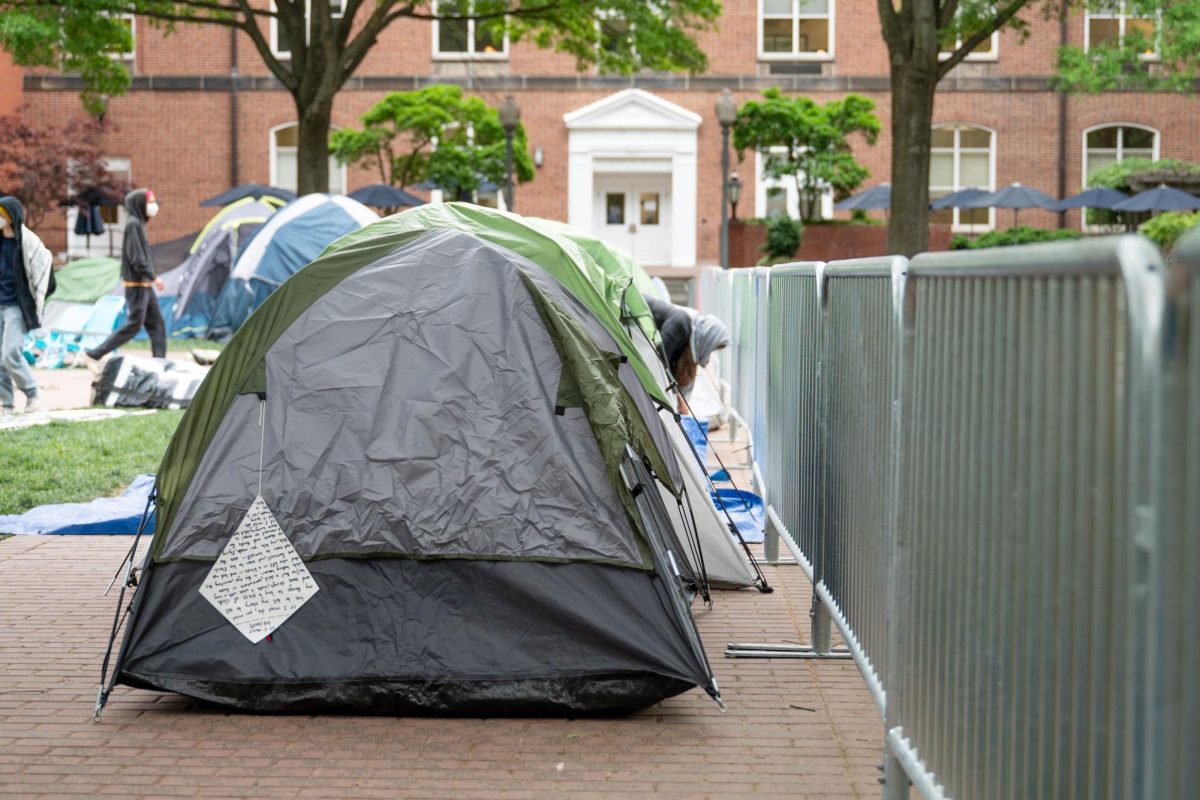
Updated 10:02 a.m. — GW campus occupations through the decades
GW joined over two dozen universities across the country on Thursday to demand their schools divest from companies with ties to Israel after protesters vowed to occupy University Yard until officials complied with their demands.
But throughout GW history, students have built a long legacy of protesting global conflicts from the streets of Foggy Bottom, from the Vietnam War to South African apartheid. Here are some of the most notable demonstrations throughout GW’s history:
April 24, 1969: A group of 40 members from Students for a Democratic Society seized and occupied the Institute for Sino-Soviet Studies, a center in the Elliott School of International Affairs dedicated to research surrounding the Soviet Union and the People’s Republic of China, for roughly five hours to protest the University’s actions regarding the Vietnam War.
Protesters demanded officials close the institute, cut ties with schools offering Reserve Officers’ Training Corps programs, admit all Black students who apply to the University and grant amnesty to those involved with the occupation.
During the occupation, a crowd of about 1,000 students – most of whom disapproved of the demonstration and acted hostile towards the occupiers – milled around the building until after midnight. The then-Vice President of Student Affairs William P. Smith told demonstrators around 3:10 a.m. that if they did not leave the building within 15 minutes, the University would seek a ten day temporary restraining order against them. Demonstrators exited the building after the announcement.
“The building was emptied two minutes before the deadline,” a Hatchet article from April 24, 1969 states.
May 6, 1970: More than 1,000 students occupied the building now known as the University Student Center and informally dubbed it the “Kent State Memorial Center” to honor the five Kent State college students who were killed by Ohio National Guardsmen at a rally opposing the expansion of U.S. involvement in the Vietnam War and the draft.
Students rededicated the building following a campus procession by silent marchers grieving the shooting at Kent State.
“The dedication followed a procession around campus by 800 silent marchers mourning the five Kent State students who were killed by Ohio National Guardsmen. Another student still lies critically injured,” read a Hatchet article from May 6, 1970.
Then-University President Lloyd Elliott canceled classes in response to the widespread campus protests after the demonstrations cut classroom attendance by 30 percent. The University’s final exam schedule hung in limbo after the protests.
Administrators named the building a year later after Cloyd Heck Marvin, a former University president who worked to prevent Black students from enrolling at GW and threatened to kick GW Hillel off campus. Students walked out of the ceremony where officials swore the Marvin name in to protest the building’s new namesake.
November 21, 1985: More than 40 anti-apartheid student protestors demanded officials immediately divest from companies that operated in South Africa and form a committee of student, faculty and administrators to recommend divestment strategies and a timetable for implementation.
“Singing 1960’s protest songs and chanting ‘Break the ties to apartheid,’ GW Voices for a Free South Africa staged a candlelight vigil on the steps of Rice Hall yesterday afternoon to catch the attention of employees and administrators leaving the building,” The Hatchet reported.
A month earlier, then-University President Lloyd Elliott said he would know within “two or three months” if GW could build an investment portfolio free of companies that operated in South Africa. But when protestors demanded for divestment in November, Elliott questioned the effectiveness of the U.S. divesting unless other major stakeholder countries divested as well.
April 17, 2000: Scores of protesters across the country swarmed GW’s campus to attempt to close International Monetary Fund and World Bank meetings in Foggy Bottom. Nearly 30 students created human chains across campus, diverting traffic and disrupting pedestrians, students and tourists who attempted to walk through the Foggy Bottom and downtown areas of the District.
“Chanting ‘peace, love, unity, respect, no more power to the IMF,’ a group of nearly 30 protesters sat in a human chain in the intersection of 23rd and H streets for half an hour while cars attempting to pass through the intersection were forced to turn around,” The Hatchet reported.
Busloads of MPD officers decked out in riot gear used smoke grenades to disperse a flood of protesters, who dressed in black and waved flags with anarchy symbols, from G Street. The officers left after a brief stand-off with students on the corner of 21st and G streets. Some GW students said they felt safe and supported the student’s demonstration of First Amendment rights, despite the crowds of police and protesters on campus.
Updated: 9:32 a.m. — Protesters pitch additional tent on H Street
Students have begun playing soft instrumental music from a speaker. On H Street, protesters are pitching an additional tent. Groups of protesters are lining the sidewalk, wrapped in blankets to warm up.
Someone donated fresh strawberries to the street demonstration.
A cluster of officials, including Dean of Students Colette Coleman, watch the encampment at the steps of Lisner Hall. Coleman broke from the circle to speak with GWPD officials, including Chief James Tate.
Updated: 8:48 a.m. — Encampment remains quiet as demonstrators rise
Students are exiting their tents and continue to mill around, but the encampment remains relatively quiet, besides the chirping of birds. GWPD officers stationed private security around the yard over the past hour, and GWPD Chief James Tate has strolled the perimeter in a chalk-blue suit.
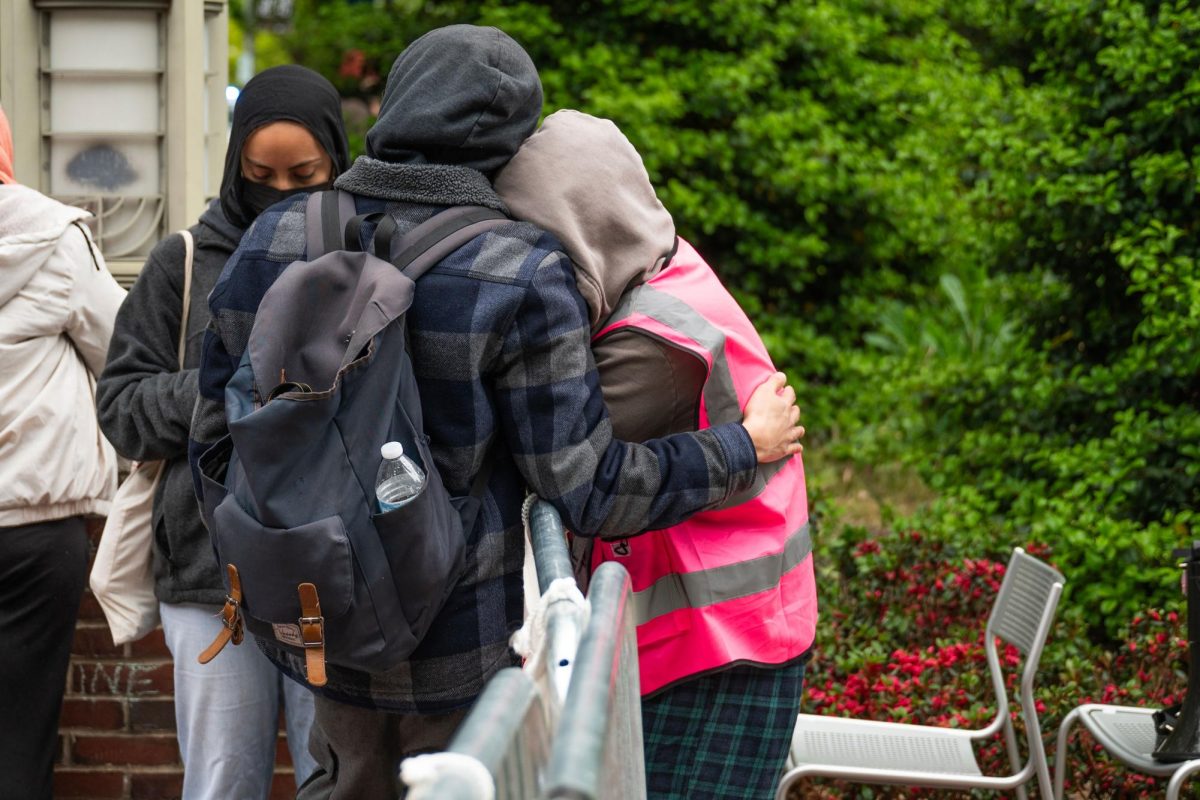
Updated: 8:45 a.m. — MPD focused on clearing tents from H Street, officer says
A Metropolitan Police Department officer said MPD is focused on reopening the stretch of H Street between 21st and 20th streets, where demonstrators pitched more than 15 tents last night, as soon as possible.
The officer said the low amount of weekend traffic likely won’t bring many cars through campus, but officers want to clear the street as soon as possible.
They said officers are committed to supporting First Amendment activities and protests, as long as those demonstrations do not turn physical.
An MPD spokesperson did not immediately return a request for further comment.
Updated: 7:07 a.m. — Sunrise
The sun has risen. It’s a cloudy morning, and most of the U-Yard protesters are still in their tents.
People outside the gates are starting to wake up. A small group of demonstrators are gathered outside the main gate of U-Yard, and a good number of students are still meandering around H Street outside of the gates.
The number of GWPD officers has upticked slightly, but the overall police presence is still consistent with the past few days.
Updated: 6:47 a.m. — Passersby
At least two onlookers have passed through U-Yard, seemingly unaware of its closure and the demonstration within. The two southern gates barricading the area are unguarded.
Updated: 6:26 a.m. — Weather forecast
The weather, while sometimes chilly, has been largely cooperative with protesters — but that could change Saturday afternoon as forecasts show a chance of rain starting at 10 a.m.
Temperatures will remain somewhat cool on Saturday, with highs expected to reach the low 60s. NBC Washington forecasts more than a 30 percent chance of rain for D.C. from 10 a.m. through 3 p.m. Saturday.
The outlook after Saturday is sunny, though: Temperatures are expected to reach 84 degrees on Sunday and touch 90 degrees Monday, and no precipitation is expected either day.
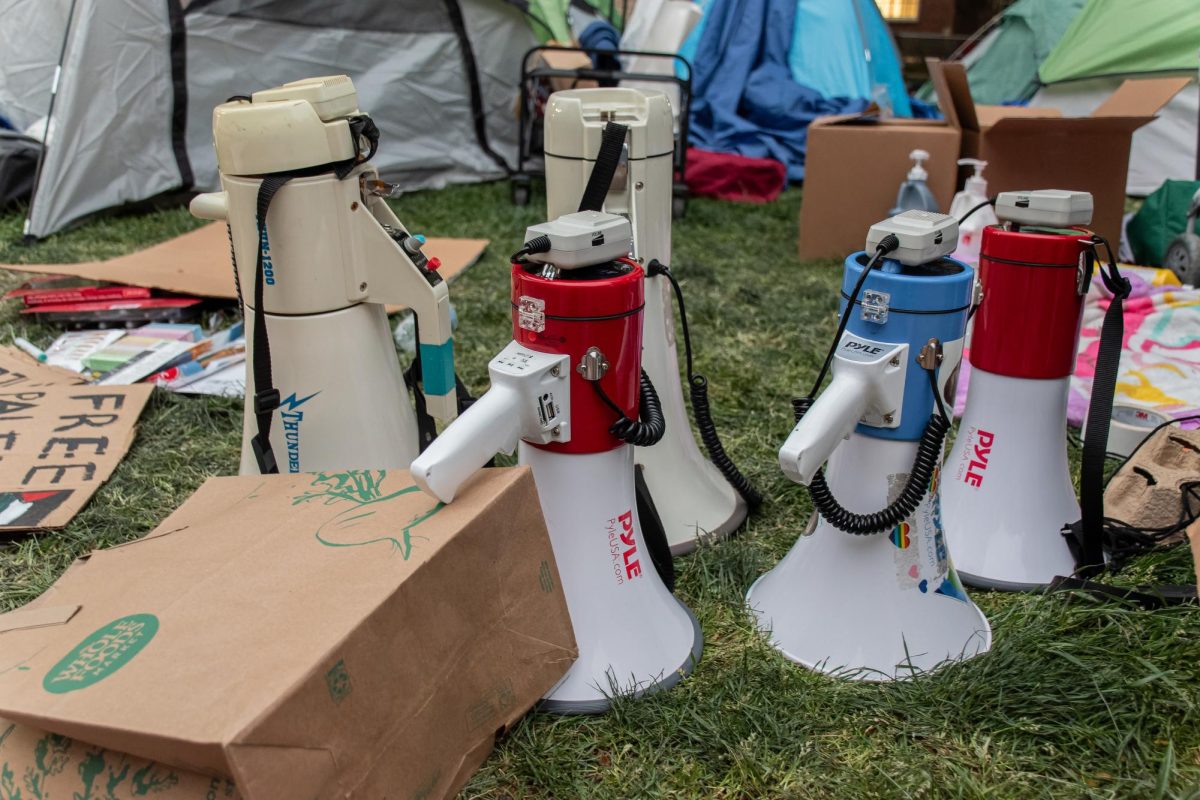
Updated: 5:59 a.m. — A history of D.C. encampments as protest
Encampments as a form of protest have happened on D.C. public property before.
When campers were based solely in U-Yard, GW has jurisdiction to declare the group trespassers and, theoretically, shut down the encampment — though MPD reportedly refused to do so Friday. But with an encampment now on H Street, public property, the onus is largely on D.C. police and city government.
D.C. law states that it is unlawful to crowd or obstruct a road. The law also states it is unlawful to engage in a demonstration in an area where it is usually forbidden or to continue a demonstration after officers have instructed demonstrators to cease.
In February, activists camped outside Secretary of State Antony Blinken’s house for 12 days. It’s unclear how that encampment ended.
In 2020, demonstrators camping at Black Lives Matter Plaza said they were forced out of tents and out of the area around 10 a.m. the morning after they pitched the tents. MPD told DCist that police gave demonstrators three warnings via loudspeaker.
MPD officers arrested about two dozen protesters in February who were urging politicians and government staffers to support a ceasefire in Gaza for blocking traffic on major roads like the intersection of 23rd Street and Constitution Avenue.
In October 2011, the Occupy D.C. movement began demonstrating in McPherson Square. U.S. Park Police gave protesters a Jan. 30 deadline to clear the encampment and swept the park on Feb. 4. Occupy D.C. protesters then pitched “symbolic vigil tents,” which stayed up until June.
Read the rest of the original post here:
City officials said MPD might decide to clear U-Yard “if the demonstrators began committing or advocating violence,” according to the Post. It’s unclear if and when police may seek to halt the encampment.
Police presence in the area remained consistent early Saturday morning — a handful of GW Police Department and MPD vehicles parked on H Street throughout the night. The lights of MPD vehicles lit up the colorful chalk messages on the pavement, messages that included “Cops off our campus now,” and “Free Palestine.”
This story is developing. Check back for updates.


